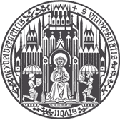Constructive Fermionic Field Theory
Course at Universität Heidelberg
Spring 2015
Instructor
Manfred Salmhofer,
Institut für Theoretische Physik
Subject
Fermionic field theories are quantum field theories
that can be defined in terms of fermionic fields
with a short-range interaction. Examples include the
Gross-Neveu and Yukawa models, as well as correlated fermion models
used in the theory of condensed-matter systems and cold atomic gases.
This course is to provide an overview of fermionic field theories,
an introduction to the methods used in the
mathematically rigorous construction of their correlation functions, and proofs of selected results.
Plan
-
Introduction to the setting and some typical models; precise formulation of the main questions
-
Field-theoretic techniques (functional integrals, effective actions)
-
Expansion techniques (perturbation theory, other loop expansions)
-
Analysis on Grassmann algebras
-
Tree techniques and their generalizations; analyticity proofs
-
Multiscale iterations, a.k.a. the renormalization group
-
Application to selected models
Target Group
The course is intended for students interested in doing a Master's or PhD degree
in mathematical physics. It should be accessible to students from the 6th semester onwards.
Prerequisites
A good knowledge of analysis and linear algebra, as well as quantum theory.
Previous exposure to quantum field theory and statistical mechanics is helpful,
but not strictly necessary to follow this course.
Literature
will be announced in class
Coordinates
| Time: |
Thursdays, 9:15-11:00 |
| Place: |
Seminar room, Philosophenweg 19 |
| starts |
April 16, 2015 |





